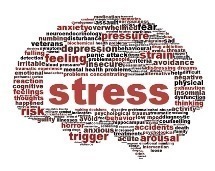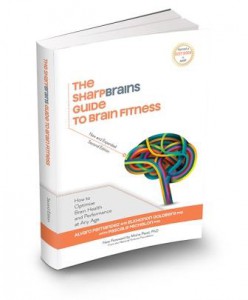 These days, we all live under considerable stress — economic challenges, job demands, family tensions, always-on technology and the 24-hour news cycle all contribute to ceaseless worry. While many have learned to simply “live with it,” this ongoing stress can, unless properly managed, have a serious negative impact on our ability to think clearly and make good decisions, in the short-term, and even harm our brains in the long-term.
These days, we all live under considerable stress — economic challenges, job demands, family tensions, always-on technology and the 24-hour news cycle all contribute to ceaseless worry. While many have learned to simply “live with it,” this ongoing stress can, unless properly managed, have a serious negative impact on our ability to think clearly and make good decisions, in the short-term, and even harm our brains in the long-term.
Recent studies show that chronic stress can also lead to depression, and even to a higher risk of cognitive decline and Alzheimer’s disease symptoms. Why? Under stress, the brain’s limbic system — responsible for emotions, memory and learning — triggers an alarm that activates the fight-or-flight response, increasing the production of adrenaline (epinephrine) and cortisol, which work together to speed heart rate, increase metabolism and blood pressure, enhance attention, the immune system and anti-inflammatory response, and lower pain sensitivity — all good things when your very survival is on the line. When the stressful situation is over, the body resets back to normal.
However, under constant stress, the body is unable to reset. High adrenaline and cortisol levels persist, potentially causing blood sugar imbalances and blood pressure problems, and whittling away at muscle tissue, bone density, immunity and inflammatory responses. These events block the formation of new neural connections in the hippocampus, the part of the brain responsible for encoding new memories. When these new connections are blocked, the hippocampus can actually shrink in size, hindering memory.
Too much stress can almost make us “forget” how to make changes to reduce that stress, limiting the mental flexibility needed to find alternative solutions and triggering general adaptation syndrome (GAS) — better known as “burnout” — which makes us feel unmotivated and mentally exhausted. This is why, next time you forget someone’s name at a party, try to not obsess about remembering it. Instead, make fun of your DNA (we are all human, aren’t we). The name in question is then more likely to appear in your mind when you less expect it.
What Can You Do?
Rather than simply living with stress, learning how to effectively master our stress levels and build emotional resilience can not only help you feel and perform better on a daily basis, but also protect your brain from the long-term damaging effects of stress. Here’s how to do it:
- Get some exercise: Studies show that aerobic exercise helps build new neurons and connections in the brain to counteract the effects of stress. In fact, a 2012 study found that people who exercised very little showed greater stress-related atrophy of the hippocampus (the part of the brain that stores memories) compared to those who exercised more. Regular exercise also promotes good sleep, reduces depression and boosts self-confidence through the production of endorphins, the “feel-good” hormones.
- Relax: Easier than it sounds, right? But relaxation — through meditation, tai chi, yoga, a walk on the beach, or whatever helps to quiet your mind and make you feel more at ease — can decrease blood pressure, respiration rate, metabolism and muscle tension. Meditation, in particular, is tremendously beneficial for managing stress and building mental resilience. Studies also show that getting out into nature can have a positive, restorative effect on reducing stress and improving cognitive function. So move your yoga mat out into the yard, or turn off that treadmill and take a walk in the park. Your brain will thank you for it.
- Socialize: When your plate is running over and stress takes over, it’s easy to let personal connections and social opportunities fall off the plate first. But ample evidence shows that maintaining stimulating social relationships is critical for both mental and physical health. Create a healthy environment, inviting friends, family and even pets to combat stress and exercise all your brains.
- Take control: Studies show a direct correlation between feelings of psychological empowerment and stress resiliency. Empowering yourself with a feeling of control over your own situation can help reduce chronic stress and give you the confidence to take control over your brain health. Some videogames and apps based on heart rate variability can be a great way to be proactive and take control of our stress levels.
- Have a laugh: We all know from personal experience that a good laugh can make us feel better, and this is increasingly backed by studies showing that laughter can reduce stress and lower the accompanying cortisol and adrenaline levels that result. Having fun with friends is one way to practice to two good brain health habits at once. Even just thinking about something funny can have a positive effect on reducing stress and the damage it causes to your brain.
- Think positive: How you think about what stresses you can actually make a difference. In one study at Harvard University, students were coached into believing that the stress they feel before a test could actually improve performance on graduate school entrance exams. Compared with students who were not coached, those students earned higher scores on both the practice test and the actual exam. Simply changing the way you look at certain situations, taking stock of the positive things in your life and learning to live with gratitude can improve your ability to manage stress and build brain resilience.
Living with high levels of sustained stress can have a profound negative impact on your psychological and brain health. While often there is little we can do to change the stressful situation itself, there are many things we can do to alter or manage our reactions to it. Managing stress and mastering our own emotions through simple lifestyle changes and the use of basic techniques that anyone can do can help reduce stress-related damage to the brain, improve emotional resilience  and thwart cognitive decline as we age.
and thwart cognitive decline as we age.
–This is an adapted excerpt from the new book “The SharpBrains Guide to Brain Fitness: How to Optimize Brain Health and Performance at Any Age” (April 2013; 284 pages). This user-friendly, how-to guide cuts through the clutter of media hype about the latest “magic pill” for better brain health, offering proven, practical tips and techniques that anyone can use to enhance and maintain brain function throughout life and even ward off cognitive decline.


Ingen kommentarer:
Legg inn en kommentar